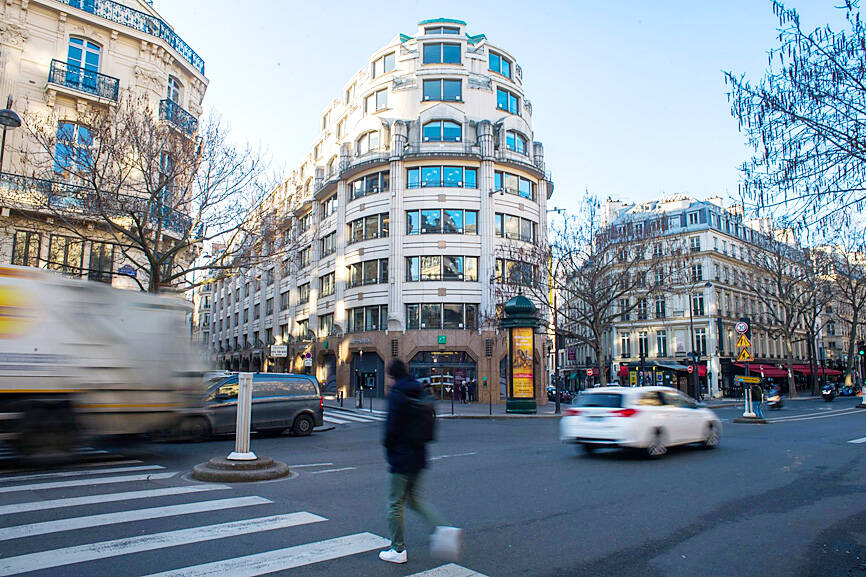BNP Paribas SA plans to move the majority of its Hong Kong staff out of offices in the Central business district, as the lender looks to cut costs and adjust to the post-COVID-19 era, people familiar with the matter said.
The French lender is weighing shifting nearly all of its staff in Two International Finance Centre (IFC), a prestigious complex in a coveted location, to offices in Taikoo Place on the east side of Hong Kong island, the people said.
The move is set to happen as soon as next year, and some bankers might stay behind in the Central building, the people said.

Photo: Bloomberg
BNP Paribas’ asset management business is already based in Lincoln House of Taikoo Place, information on its Web site says. It currently has four floors in Two IFC, the people said.
WORKSPACE CHANGE
“The Hong Kong financial industry has entered a new phase of workspace transformation, and we have reassessed our operations post pandemic and taken the opportunity to shift to a more dynamic smart workspace, which allows greater collaboration and mobility,” a spokeswoman for BNP Paribas said in response to a Bloomberg News query.
The move comes as financial institutions are looking to trim costs by cutting staff globally amid persistent inflation and a slowdown in dealmaking. Citigroup Inc is set to join Wall Street rivals JPMorgan Chase & Co and Goldman Sachs Group Inc in cutting jobs, Bloomberg News has reported.
A rise in Hong Kong’s office vacancy rates and falling rents during the pandemic has weighed on the territory’s premier properties. Jefferies Financial Group Inc moved from billionaire Li Ka-shing’s (李嘉誠) skyscraper in Hong Kong’s Central district to Two IFC in December last year.
The building is also home to the regional offices of financial firms, including UBS Group AG.
Comprising 418,064m2, International Finance Centre features more than 200 stores and office space as well as a Four Seasons hotel, its Web site shows.
CREDIT SUISSE
Separately, Credit Suisse Group AG has obtained licenses allowing it to launch its wealth management business in China in the first half of this year, as well as expand its securities trading and research activities onshore.
The bank received its investment consultancy, proprietary trading and nationwide brokerage licenses, an internal memo said.
A spokeswoman for the bank confirmed the contents of the memo.
The approvals mark progress for the embattled Swiss lender, which last year faced delays in getting approvals for some of its China operations after a flurry of senior management departures. In preparation for the launch of its wealth management business in China, Credit Suisse plans to double the number of relationship managers onshore, the memo said.
The European lender made deep cuts to its China workforce in November last year as part of the global overhaul, letting go at least one-third of its investment bankers and about 40 percent of research staff.
Carsten Stoehr, chief executive officer for Greater China, quit in December, among the most senior departures.

To many, Tatu City on the outskirts of Nairobi looks like a success. The first city entirely built by a private company to be operational in east Africa, with about 25,000 people living and working there, it accounts for about two-thirds of all foreign investment in Kenya. Its low-tax status has attracted more than 100 businesses including Heineken, coffee brand Dormans, and the biggest call-center and cold-chain transport firms in the region. However, to some local politicians, Tatu City has looked more like a target for extortion. A parade of governors have demanded land worth millions of dollars in exchange

Hong Kong authorities ramped up sales of the local dollar as the greenback’s slide threatened the foreign-exchange peg. The Hong Kong Monetary Authority (HKMA) sold a record HK$60.5 billion (US$7.8 billion) of the city’s currency, according to an alert sent on its Bloomberg page yesterday in Asia, after it tested the upper end of its trading band. That added to the HK$56.1 billion of sales versus the greenback since Friday. The rapid intervention signals efforts from the city’s authorities to limit the local currency’s moves within its HK$7.75 to HK$7.85 per US dollar trading band. Heavy sales of the local dollar by

Taiwan Semiconductor Manufacturing Co’s (TSMC, 台積電) revenue jumped 48 percent last month, underscoring how electronics firms scrambled to acquire essential components before global tariffs took effect. The main chipmaker for Apple Inc and Nvidia Corp reported monthly sales of NT$349.6 billion (US$11.6 billion). That compares with the average analysts’ estimate for a 38 percent rise in second-quarter revenue. US President Donald Trump’s trade war is prompting economists to retool GDP forecasts worldwide, casting doubt over the outlook for everything from iPhone demand to computing and datacenter construction. However, TSMC — a barometer for global tech spending given its central role in the

An Indonesian animated movie is smashing regional box office records and could be set for wider success as it prepares to open beyond the Southeast Asian archipelago’s silver screens. Jumbo — a film based on the adventures of main character, Don, a large orphaned Indonesian boy facing bullying at school — last month became the highest-grossing Southeast Asian animated film, raking in more than US$8 million. Released at the end of March to coincide with the Eid holidays after the Islamic fasting month of Ramadan, the movie has hit 8 million ticket sales, the third-highest in Indonesian cinema history, Film